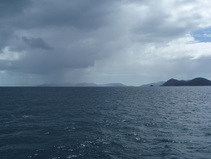 Have you ever gotten the feeling of being in a location even though you’ve never physically travelled there? Maybe it's a sensation that you get in a meal from an authentic Italian restaurant. The buttery flavor of pasta and the rich tannins from a Chianti linger on the tongue and evoke an image of a stroll along the Via del Corso with views of the Parthenon on one side and the Trevi Fountain on the other. Or perhaps you’ve passed a grove of cherry blossoms and the white and pale pink flowers with just a hint of lilac, rose and vanilla wafting from the beauteous foliage and have been instantly transported to medieval Japan replete with white-faced geishas in pastel kimonos and fierce samurai warriors wielding burnished steel katanas. The above paragraph employed taste, sight and smells to call forth different times and places. As a writer your words are the tools to evoke that different time and place. Your words have to carry the tastes, sights, smells, sounds, and feel of a scene for your readers. Those words have to transport them to that distant planet with its dual moons or that palace rife with intrigue in a mythic kingdom poised for war with its rival. Here are few examples from some great writers of how description can evoke a certain place and time: From James Elroy’s Perfidia-- A line of armored vehicles chugged west on Sunset to fevered scrutiny and applause. It took a full ten minutes for the armada to pass. The noise was loud, the cheers louder. People stopped their cars to get out and salute the young soldiers. It played hell with the flow of traffic — but no one seemed to care. The soldiers were delighted by this display of respect and affection. They waved and blew kisses; a half dozen waitresses from Dave's Blue Room ran out and passed them cases of liquor. Somebody shouted, "America!" That's when I knew. From Wuthering Heights by Emily Bronte-- One stop brought us into the family sitting-room, without any introductory lobby or passage: they call it here 'the house' pre- eminently. It includes kitchen and parlour, generally; but I believe at Wuthering Heights the kitchen is forced to retreat altogether into another quarter: at least I distinguished a chatter of tongues, and a clatter of culinary utensils, deep within; and I observed no signs of roasting, boiling, or baking, about the huge fireplace; nor any glitter of copper saucepans and tin colanders on the walls. One end, indeed, reflected splendidly both light and heat from ranks of immense pewter dishes, interspersed with silver jugs and tankards, towering row after row, on a vast oak dresser, to the very roof. The latter had never been under-drawn: its entire anatomy lay bare to an inquiring eye, except where a frame of wood laden with oatcakes and clusters of legs of beef, mutton, and ham, concealed it. Above the chimney were sundry villainous old guns, and a couple of horse-pistols: and, by way of ornament, three gaudily-painted canisters disposed along its ledge. The floor was of smooth, white stone; the chairs, high-backed, primitive structures, painted green: one or two heavy black ones lurking in the shade. In an arch under the dresser reposed a huge, liver-coloured bitch pointer, surrounded by a swarm of squealing puppies; and other dogs haunted other recesses. From Octavia Butler’s Dawn-- Cloth! A folded mound of clothing. She snatched it up, dropped it in her eagerness, picked it up again and began putting it on. A light-colored, thigh-length jacket and a pair of long, loose pants both made of some cool, exquisitely soft material that made her think of silk, though for no reason she could have stated, she did not think this was silk. The jacket adhered to itself and stayed closed when she closed it, but opened readily enough when she pulled the two front panels apart. The way they came apart reminded her of Velcro, though there was none to be seen. The pants closed in the same way. She had not been allowed clothing from her first Awakening until now. She had pleaded for it, but her captors had ignored her. Dressed now, she felt more secure than she had at any other time in her captivity. It was a false security she knew, but she had learned to savor any pleasure, any supplement to her self-esteem that she could glean. Notice, that even in these short passages, how the language calls forth a specific time and place, whether it's America just before World War II, early nineteenth century England, or a futuristic extra-terrestrial’s environment. Also, pay attention to the use of voice in the descriptions. James Elroy tends to be terse and to the point while Emily Bronte uses very descriptive flowery language reminiscent of nineteenth century writers. Butler’s style is more direct. Use the right language to evoke your story’s time and place and transport your audience to worlds they will never forget.
0 Comments
Leave a Reply. |
Archives
June 2023
Categories |
 RSS Feed
RSS Feed